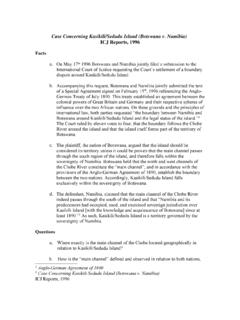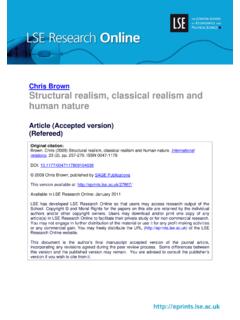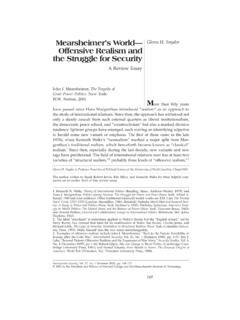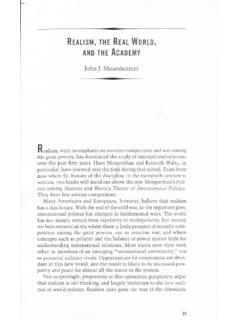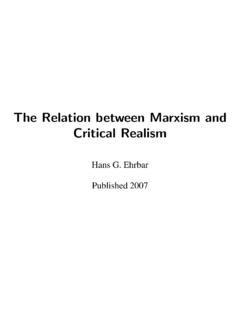Transcription of Introduction to International Relations - Kvasaheim
1 Introduction to International Relations Chapter Notes: Chapter 4 Ole J. Forsberg, University of Tennessee Chapter Four: World War II Through the Perspectives Chapter Overview Chapter 4 examines the interwar period, exposing students to several explanations for the occurrence of World War II. It focuses on the failure of the League of Nations and with it, the failure of collective security as a primary liberal account for the war. It also details the continuing instability of the European balance of power, largely due to Germany, as a realist explanation. From the identity perspective, this chapter compares several different forms of nationalism and considers the notion that the rising tide of nationalism an ideational concept could be the root of World War II. Liberal Explanations After World War I, the concept of collective security was pursued through the League of Nations.
2 In the League, all council members had veto power (also known as unanimity). Due to American isolationism, United States did not participate. Failure of the League Lack of participation limited its power Failed to effectively guarantee security Pursued disarmament, which increased insecurity Unanimity led to its undoing; after Manchurian invasion, Japan vetoed the League s report Realist Explanations For realists, problem was still Germany. Versailles Treaty gutted Germany and placed punitive reparations on it under the war guilt clause. The League failed to balance Germany against small, weak states to its east. Germany s response Notes 04 World War 1 Broke from the League of Nations in 1933 Marched into demilitarized Rhineland in 1936 Annexed Austria in 1938 Annexed Sudetenland in 1938 Germany s Security Dilemma Germany was too big for neighbors to feel comfortable, but if neighbors allied together, Germany was too small to feel comfortable.
3 Responded with same strategy used in World War I: Strengthen position in east, eliminate adversary in west, then turn east to finish off Russia. Identity Explanations Self-determination meant that states could adopt whatever identities that they wanted. Self-determination also added more national cultures to the mix. As a result, there was much dissatisfaction with state boundaries in Europe. Forms of Nationalism Cultural nationalism is the glorification of one national culture over another. Led to confusion and controversy who deserved to be their own state? Liberal democratic nationalism builds a community ethos around constitutional rights and promotes free markets. Clearest example was United States. Socialist democratic nationalism advocated individual rights but promoted state ownership of key economic sectors.
4 Prominent in Europe. Communist nationalism brought radical edge to socialism and stirred up politics in Europe. As communist nationalism stirred politics on left, fascist and racist nationalism roiled the right. Racist nationalism hit a maniacal extreme in Germany when it culminated in the Holocaust. Thought Questions 1. Can World War II be effectively explained without reference to the individual level of analysis? Why or why not? 2. Had the League of Nations been a stronger institution with universal participation, could World War II have been prevented? Notes 04 World War 2 3. Compare realist explanations for World War II, which rely on the European imbalance of power, and identity explanations for World War II, which are centered on nationalism. Which argument, to you, is stronger?
5 Why? 4. Consider the Treaty of Versailles that ended World War I. Had its stipulations been different, could World War II have been prevented? 5. What prevented collective security from operating effectively prior to World War II? Is collective security a more viable option today than it was during the interwar period? Why or why not? Notes 04 World War 3
